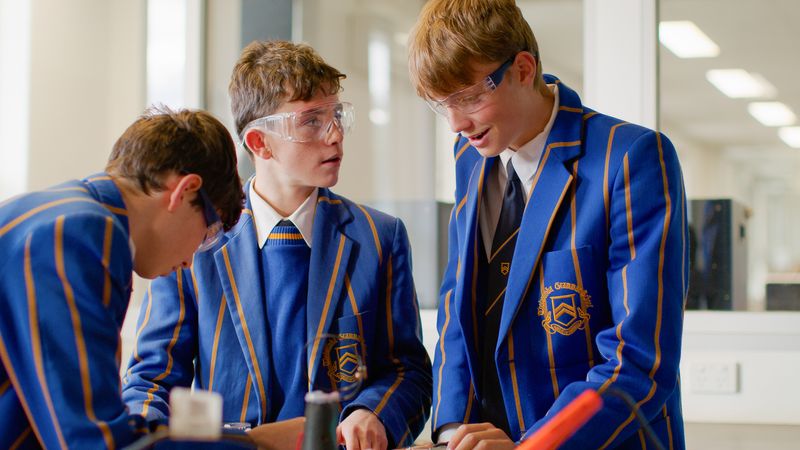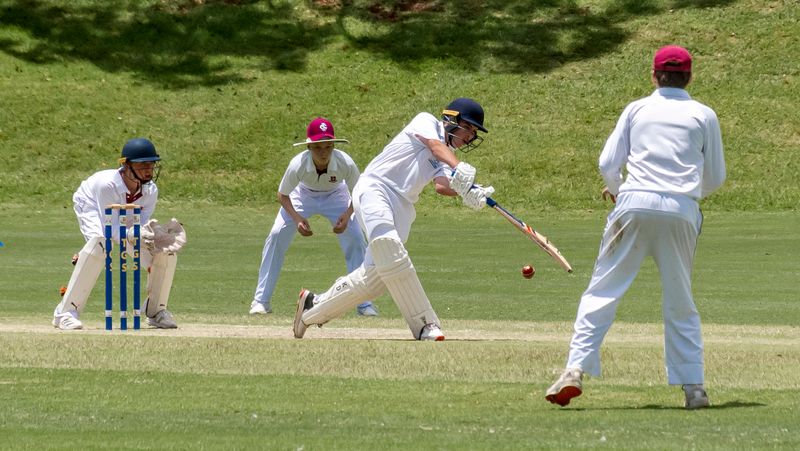“Many of the respondents spoke of controlling the controllables across six broad themes: Consistency and Routine, Using Study Tools, Environment Control, Intrinsic Motivation, Resilience and Perspective.”Mrs Crystal Hede, Director of Learning and Innovation

Giving students the opportunity to cope with disappointment has the capacity to shape their good character.
Schools are inherently hopeful and happy places. Their natural focus on growth, connectedness and preparing youth for a better future creates an optimistic atmosphere in which ambitions are born. These positive emotions and experiences lay the foundation for our expectations and while these can be highly motivating, they come with a catch: the greater our expectations, the greater the disappointments, too.
Disappointment is not a popular feeling. Rightly so, not many of us wish to feel sad, displeased or frustrated by the non-fulfilment of our hopes or expectations. However, in an academic setting, disappointments are inevitable and they can manifest in various forms. Commonly, students can find it hard to understand a concept that they see their peers comprehending and receive a lower-than-desired assessment result. Even worse, they can feel “robbed” of a grade that they believed to be rightfully theirs, not be with their preferred teacher, fall short of the required points for an academic award and face unexpected obstacles that disrupt their learning. Invariably, students will experience one or more of these things at some point in their schooling, possibly all of them, often.

For parents, it can be incredibly difficult to watch our children experience these things, especially when they result in further negative emotions such as shame or self-loathing. Sometimes, the worry we feel for our children is almost unbearable and it is natural to want to fix the problem for them. Prominent clinical psychologist, Dr Judith Locke is a leading voice on this topic. In her article, Kids need to fail. And parents need to let them; she says, “When your child is disappointed, it’s understandable you want them to feel better immediately, but taking temporary bad feelings away makes your child less capable to face inevitable trickiness in the future.” Locke goes on to say, “While I know it feels awful to watch your child be disappointed or sad, every time you help them avoid those feelings, you also sidestep them learning essential skills of resilience and a belief they will cope if life doesn’t always go their way.”

For these reasons, we will not shield students from experiencing disappointment at TGS. Doing so would be detrimental to their development and this fails to prepare them for the realities of life. Most importantly, giving students the opportunity to cope with disappointment has the capacity to shape their good character. As beautifully put by Irish politician Sir Boyle Roche, “Disappointment is the nurse of wisdom.”
I sought the wisdom of some of our older TGS students who have learned to manage their disappointments over time and even harness them for good. Specifically, I surveyed recipients of diligence awards because these recognise dedication and resilience rather than grades. All the respondents admitted to encountering setbacks and shared various versions of not letting these deter their efforts. One of the seniors said, “When faced with disappointment, I use ‘failure’ as a motivator to strive for improvement and apply the feedback I receive to make adjustments for the future.”
- Consistency and Routine: Diligent students emphasised the importance of sticking to a structured study schedule. They often study at the same time every day and for consistent durations to build a habit of regular learning.
- Using Study Tools: Many of these students use study trackers, whiteboards and diaries to reinforce learning and ensure they systematically cover all necessary material.
- Environment Control: They create and maintain separate spaces for study and relaxation to condition their minds for productive work when in the study zone. This includes removing any electronic devices from the study area.
- Intrinsic Motivation: Consistently, the diligent students spoke of a strong internal drive to improve and put in the effort required to overcome academic hurdles. This includes proactively seeking clarification or help.
- Resilience: Their responses demonstrated resilience in the form of a “bounce back” mentality. They spoke of accepting that not all decisions will be to their liking (for example, class allocations), acknowledging their negative emotions and then moving on in order to stay focused on their learning.
- Perspective: Maturely, some of the boys spoke about managing their expectations. While hopes and dreams can be powerful motivators, it’s important to balance them with realistic expectations to maintain a healthy mindset.
TGS Old Boy (2011-13) and 2024 Paris Olympic medalist, Matthew Denny recently spoke with our students, sharing some anecdotes and advice that aligned with the above sentiments. He said that one of the biggest things he learned from his career was that “Success lies on the other side of discomfort. You just need to step toward it and keep moving.” Matthew’s wise words support the notion that disappointment — a form of discomfort — is a natural and expected part of life that forms our character as we strive towards our goals and aspirations. With this in mind, our TGS boys need to keep dreaming but expect that disappointment will occur. They need to keep moving and trying and see disappointment as an opportunity for learning.
Reference
Locke, J. (2019, March). Kids need to fail. And parents need to let them. The Courier Mail. Retrieved September, 2024, from https://www.couriermail.com.au/rendezview/kids-need-to-fail-and-parents-need-to-let-them/news-story/5df007cfd72f50b4a22b03c39c127781
Latest Blog
An Inclusive Education
Toowoomba Grammar School is proud to introduce the newest addition to our education team, Amanda Gibson. Amanda commenced in Term 4, 2023 in the pivotal role of Head of Diverse Learners and will bring new direction and focus to the position in alignment with our commitment to inclusive education, aligning seamlessly with our Strategic Plan 2022-2026 and the Inclusive Education Policy. “I am very excited about developing this role,” said Amanda. “I have a passion for fostering environments where…
Get Involved in Everything
As Senior Prefect at Toowoomba Grammar School, I have had the opportunity to witness the benefits of being an all-rounder firsthand. With the various activities and programs the School offers, the ability to be involved in as many things as possible is not only enjoyable but brings about numerous benefits that extend far beyond the school years. Ranging from sports to drama and debating, participating in anything the School has to offer is an excellent way to make friends and build networks of…
The Importance of Knowledge
For as long as I can remember, I’ve always enjoyed traveling great distances. As a child growing up in rural New South Wales, this was inevitable. The region was speckled with towns, some more vibrant than others, and diverse landscapes where hillside ruins whispered tales of bygone eras. Over time, these landscapes and towns transformed into familiar scenes, with even minor changes in the community and environment growing more noticeable during each visit. Education parallels this journey, as…
Senior TGS Students' Advice for Starting Senior School
Starting at a new school can be a time of mixed feelings – very exciting, but also quite daunting and challenging. Here are some tips from some Year 7 Grammar boys who started Senior School in 2023. Get involved in different sports and activities Toowoomba Grammar School provides many sports and activities that any student can participate in. As a current Year 7 student, I highly recommend trying out as many different sports and activities as you can. Throughout my first year in high school, I…
Transition to Senior School at TGS
Starting at a new school can be a time of mixed feelings – very exciting, but also quite daunting and challenging. Irrespective of whether your son is joining us from the TGS Junior School, or if they are just starting at Toowoomba Grammar School, this is the start of a long and special journey. Your son will have a lot to digest with a new, possibly larger campus to navigate, different teachers and lessons, making new friends, where to go and what to do at morning tea and lunch. There can be a…
The Transition to Year 7 - from a Parent and Staff Member's Perspective
Regardless of your history with the school, you are all equally welcome here and should feel comfortable in knowing that we value every family and their son’s contribution to our School. Toowoomba Grammar School was built by the community, for the community and it is a School that I am immensely proud of. In 2025 we will celebrate our sesquicentenary or Grammar 150 and your sons will play a vital role in those celebrations. Our pedagogy is modelled on explicit instruction which has its roots in…
Boarding Families - Surviving Homesickness
Homesickness can be brutal for both the child and their parents. As a parent it can feel like your heart is being ripped out in some cases daily. It is extremely hard hearing how sad your boy may sound on the phone, and then you are left reeling for 24hrs until the next call, you are often left worried that they are feeling like this ALL DAY. Rest assured only vary rare cases are that bad, they usually improve as they settle in, and it is temporary. The reality is that most boys tend to save…
Helpful Tips for New Boarding Parents
Name absolutely everything! Socks, undies, phone chargers, water bottles, caps. EVERYTHING!! Make sure you name items with Boy’s name & House number; most parents will put their senior house number if printing the tags so they don’t have to rename items when they move the following year (Corfe House doesn’t have a house number). Some boys find a double bed doona is a better option than single doona as it hangs down the sides of the bed a little more to keep them warmer in winter. An…
Parenting Styles: Parties and the Holidays
As the holiday season approaches, parents and caregivers find themselves immersed in the joy and bustle of festivities. Amidst the celebrations, it’s essential to pause and reflect on the pivotal role our parenting styles play in shaping our children’s attitudes and behaviours, especially concerning alcohol and other drug use. As a father of four young people with my fifth child coming into our family on 8 December 2023, I’m particularly mindful of my parenting style and my role as School…